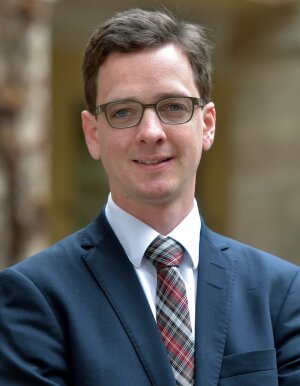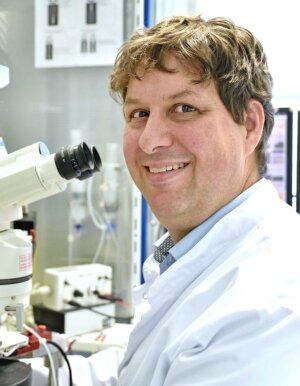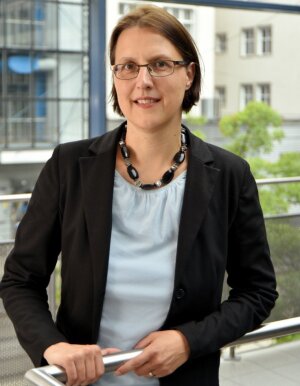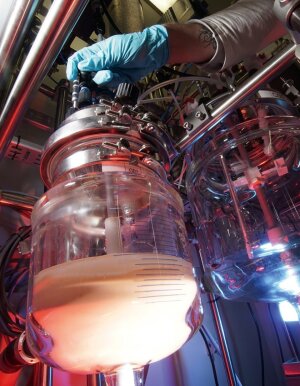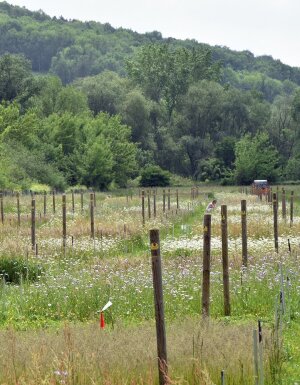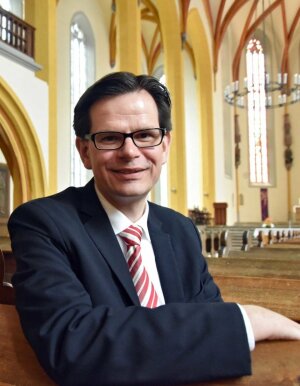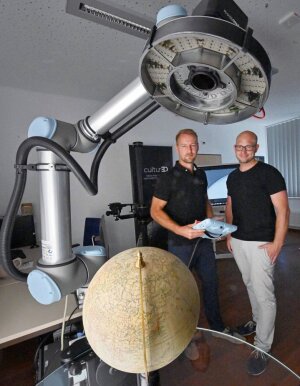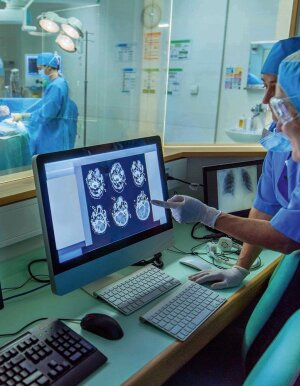New Projects
Prof. Dr Maik Wolters, Chair of Macroeconomics at the University of Jena, is the spokesperson of the new college.
Image: Jürgen Scheere (University of Jena)Digital revolution
Interdisciplinary graduate college receives funding from State of Thuringia
All areas of modern life are affected by digitalization. As part of a new graduate programme, doctoral candidates are examining the impact of digitalization on economic processes. They want to investigate how digitalization is affecting different economic actors and institutions and what consequences it has for them. The new graduate programme will receive 1.35 million euros in funding from the State of Thuringia over the next three years. The spokesperson for the group, Prof. Dr Maik Wolters (pictured left), identifies one of theresearch objectives: »One aspect of the current digitalization phase is the generation of large volumes of data. We want to adapt new statistical methods for use in the social sciences, so that we can use this data in our research,« explains the Professor of Macroeconomics. [sh]
Neuroimmunologist Prof. Dr Christian Geis is the spokesperson of the new DFG research group SYNABS, which investigates autoimmune brain inflammation.
Image: Michael SzaboSynapses under fire
DFG-funded research group investigates autoimmune encephalitis
The neurologists, physiologists, neuroimmunologists, and microscopy experts in the new »SYNABS« research group are investigating the mechanisms underlying autoimmune encephalitis in order to find new treatments for the disease. The group with partners in Germany, Austria and Spain will receive 3.9 million euros in funding from the German Research Foundation (DFG) over the next three years. The spokesperson for the group is the neuroimmunologist Prof. Dr Christian Geis (pictured right) from Jena University Hospital. Autoimmune inflammations of the brain occur when the immune system produces antibodies against receptors in the central nervous system. These antibodies interfere with the transmission of signals at the synapses, which can result in confusion, psychosis, epileptic seizures, or a loss of consciousness. [vdG]
Prof. Dr Silke Übelmesser, Professor of Finance at the University of Jena, is working together with a colleague from Mannheim in this new project.
Image: Anne Günther (University of Jena)Pension plans
Economists analyse popular opinions on pensions
Pensions are no longer safe. But how widespread is this knowledge amongst the population? Finance expert Prof. Dr Silke Übelmesser (pictured left) from the University of Jena and a colleague from the University of Mannheim address this question as part of their project. The Federal Ministry of Labour and Social Affairs will award 290,000 euros in funding over the next three years, and the University will be making its own contribution to increase the total volume to 390,000 euros. The experts want to find out whether people understand the pension system in the first place, and if a better understanding would make them more willing to accept reforms and take the initiative. They will ask for people’s attitudes towards old-age pensions and determine whether different population groups have different opinions. This will allow them to develop recommendations for educational and social policy. [PM]
Synthesis reactor in a laboratory at the Center for Energy and Environmental Chemistry (CEEC) in Jena.
Image: Jan-Peter Kasper (University of Jena)Battery research
Chemists coordinate EU training programme for energy storage research
The European Union (EU) is supporting an »International Training Network« coordinated by the Friedrich Schiller University Jena. The aim of the »POLYSTORAGE« programme, which has been allocated almost four million euros in funding, is to qualify a total of 16 doctoral candidates for leadership roles in the field of advanced energy storage (symbol photo right) in both academia and business. Funding is provided within the framework of the EU »Horizon 2020« programme. »This very comprehensive training programme combines basic research and applied science,« says Prof. Dr Ulrich S. Schubert, who coordinates the programme. It includes workshops, colloquia, and a final conference. A total of twelve funded institutions and thirteen partner institutions from research and industry are involved in the »POLYSTORAGE« programme. [MK]
Jena experiment in the Saale flood plain. In the biodiversity experiment funded by the German Research Foundation (DFG), artificially assembled grassland communities have been studied on an area of about 10 hectares since 2002.
Image: Anne Günther (University of Jena)Jena Experiment
DFG-funded research group investigates ecosystem functions
A new research group for the »Jena Experiment« will receive five million euros in funding from the German Research Foundation (DFG) over a period of four years. The scientists want to find out which mechanisms affect the relationship between biodiversity and ecosystem functions. A total of twelve scientific subprojects are involved in the new research group. The group is based at the German Centre for Integrative Biodiversity Research (iDiv) and the Universities of Leipzig and Jena. The »Jena Experiment« site in the Saale floodplain (pictured left) features around 500 research plots with different combinations of meadow plants. This unique outdoor laboratory enables the collection of long-term data to answer fundamental questions on the role of biodiversity and ecosystem functions. [PM]
Church historian Prof. Dr Christopher Spehr and his team are investigating discrimination against Christians in the GDR.
Image: Anne Günther (University of Jena)Christians in the GDR
Church historians research the discrimination
of Christians in the GDR
Citizens in the GDR came into contact with state military policy from an early age—through military education classes and paramilitary competitions. Anyone who opposed the regime ran the risk of legal, social, occupational or educational discrimination. Christians in particular were subject to such measures if they refused to do military service. Their fate is now being examined by church historians at the University of Jena as part of a new project. The four-person project team directed by Prof. Dr Christopher Spehr (pictured right) will receive around 600,000 euros in funding from the Free State of Thuringia. The results will be made available to the public in an interactive web atlas. In addition to archive material, interviews with contemporary witnesses will be used as sources. [KB]
Dr. André Karliczek (left) and Dr. Andreas Christoph work with a 3D scanner to digitally capture cultural assets.
Image: Jan-Peter Kasper (University of Jena)»cultur3D«
EU funds project for digital culture and collection management
Modern digitalization technology enables the creation of authentic three-dimensional images of historical artefacts to preserve them for future generations. Moreover, cultural assets can be digitally exploited to remove them from the shadows of closed magazines and present them to the public. Dr Andreas Christoph and his team at the University of Jena and the Thuringian State and University Library have taken on this challenge in 2017. The »cultur3D« project has now received fresh funding from the State Chancellery of Thuringia and the European Union— an additional 1.3 million euros will be invested in the project by the end of 2020. The aim is to develop workflows for optimal digitalization processes that can also be used by other institutions. Subsequently, the Jena experts want to further develop their innovative system up to series-production stage. [sh]
Physicians are reviewing a CT scan.
Image: simonkrMedical machines
Cooperative project makes machines learn better
The Technical University of Ilmenau and the Friedrich Schiller University Jena have launched a joint project to improve the accuracy and reliability of medical measuring devices. They are developing innovative methods for the integration of »intelligence« in medical technology, such as microscopes, tomographs, and ultrasound equipment (symbol photo right). They hope to develop intelligent suggestion and decision systems to support and monitor the operation of medical technology and the evaluation of measurement results. This will help to avoid operating errors and ensure and simplify the correct analysis of measurement data. The research project will receive 1.35 million euros in funding from the State of Thuringia over five years. Prof. Dr Joachim Denzler and his team of computer scientists at the University of Jena are involved in the project. [PM]
